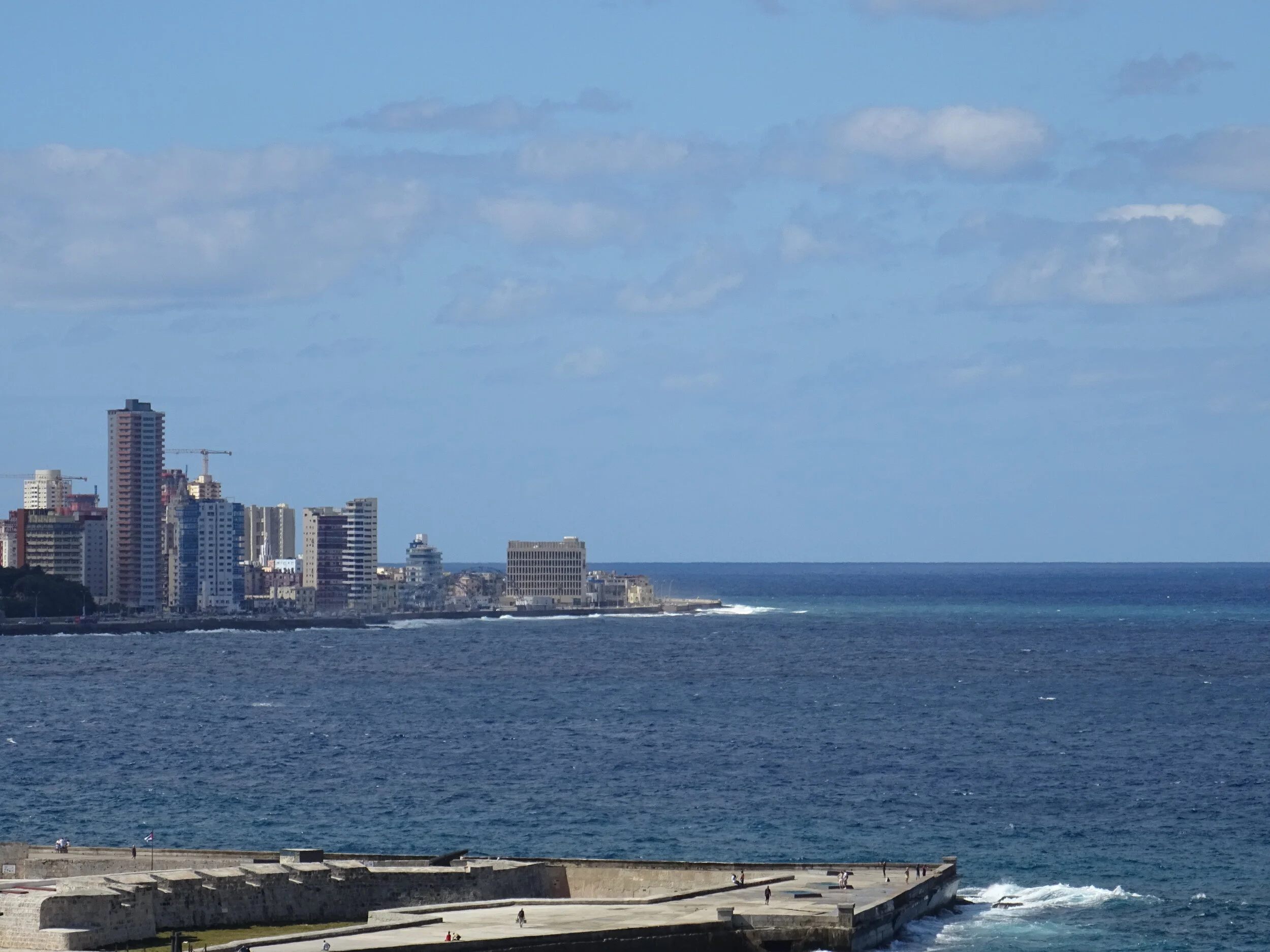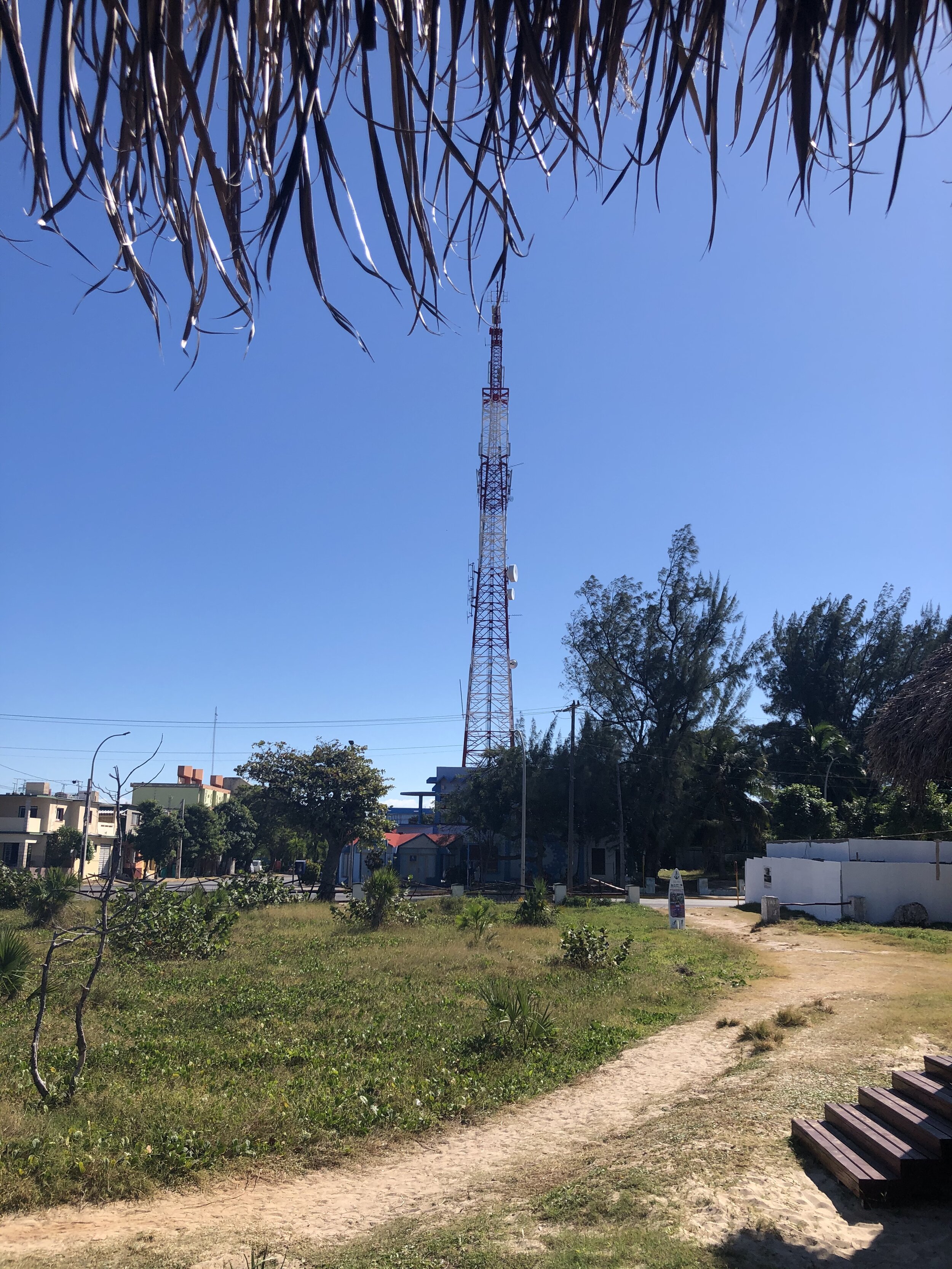Cuba
Completing our winter of holidays Mark and I flew to Cuba on 30th November. We landed in Havana in the early afternoon, to lovely sunny skies and wonderful warmth. Our lovely taxi driver found our little hotel, Hotel Moscow and we hoicked the suitcases up some very steep stairs to find an absolutely beautiful Casa Particular at the top. It was perfect for us, right in the middle of the old city, Habana Vieja, and with a roof terrace with great views over the whole city.
Mark is a our great guide reader and map reader, so we went for a quick bite to eat and a little tour of the streets before having a nap and then the most delicious supper. Because Cuba is a communist country we avoided the state run hotels and restuarants. The hotels are very expensive and fairly soulless, and the state run restuarants are also more expensive and less imaginative than privately owned ones. From the first night in Havana I was amazed at how much private enterprise is permitted by the communist regime, and we ate at such varied restuarants with such a lot of character.
The next morning we had to report to the tourist office to get our itinerary and meet our guide for the almost obligatory vintage car tour, followed by a tour of the old city on foot. Our car was a Pink, 1952 Chevrolet with beautiful white leather seats. All these cars were left behind in Havana when the Americans withdrew from Cuba during the revolution. Fidel Castro, Che Guevara and the revolutionaries arrived in Cuba on 26th July 1953. We had a fantastic tour guide in Christina, who not only showed us all the sites, but also was fantastically well informed on the history and political history of Cuba. She also took us to the best cigar shop so we could buy some lovely genuine Cuban cigars for my brother Andy.
The next morning we set off to look at the fort, the other side of the harbour. We went on the most un-health and safety ferry I have ever seen. Basically a floating container with no sides, and in common with every kind of boat we went on in Cuba, either there were no life-jackets, or they were just piled up in a corner somewhere.
Not the greatest photo - but that is the ferry behind the barrier.
We walked up from the ferry to the huge statue of Jesus, and then on past the army barracks to the fort. The most amazing array of out of commission Russian hardware sits outside the barracks, Mig fighter planes, and a huge array of missiles, and rocket launchers. We had a lovely wander round the fort, which guards the entrance to the harbour, it is just beautiful, and what a amazing number of cannons. A cannon is still fired every day at 6pm.
The second evening we went to a fantastic bar and listened to the best jazz saxophonist I have ever heard. We could have sat there all evening if they served food. But it was great to have another delicious meal, before setting off on the three hour drive to Vinales the following morning.
We were entranced by Havana, by its ravaged beauty, incredibly friendly and welcoming people and the dichotomy of old the beautiful, if tired, Colonial buildings, and the huge new State hotels which are restoring some of the old buildings incredibly beautifully, but these stand next to other incredible old buildings providing free housing which in any other city would be declared derelict.
The journey to Vinales was a good introduction to the very varied traffic in Cuba. The taxis are either Russian Ladas or Chinese cars, the buses are all Chinese, and the rest of the traffic ranges from the old American saloons, through mopeds to horses and carts, and ridden horses. Whilst we hadn’t noticed a huge police presence in Havana; although, Christina, our guide, told us that you could hardly move for plain clothes police, the police presence on the highway was huge, with checkpoints under nearly every bridge. Like everything we had seen so far in Cuba the highway was contradictory, excellent in some places, and full of enormous craters in others.
Vinales is the tobacco growing centre of Havana up in the hills.. It reminded me a little of Pokhara in Nepal, the jumping off point to the Annapurna circuit in the Himalayas, which in 1983, when I visited was like a hippy town that time had left behind. Vinales has a slightly similar vibe, super-relaxed and not a tremendous lot to do. We stayed in a lovely Casa Particular (a homestay) Villa Silvia, run by the wonderful Silvia, who made the best omelettes ever. It was a little walk into the centre of town, which in every town means the telephone exchange, which is the only place with a wifi signal. So the cafe opposite the telephone exchange was full all day long.
The first afternoon we visited Cueva del India, a beautiful series of caves in the hills, similar to the Cenotes in Mexico, but not actually underground and therefore not as freezing cold. Somehow we got swept up in a German speaking coach tour, which meant that we were shepherded into boats very efficiently and we actually had a very good explanation of exactly what was what in the caves, fairly easy to understand in my sketchy German, but I don’t expect it was that clear to Mark. Our taxi driver to the caves was the first of several fantastically well educated and informative taxi drivers. In a country whose main income is tourism, taxi driving is one of the best jobs available, however smart your degree might be.
Our second morning in Vinales was spent riding through the tobacco plantations, which was simply beautiful. Mark made the mistake of telling our guide that I was a good rider, I always emphasise how nervous I am. Mark got a lovely steady grey horse, and I got Pinto, who was wrestled out from the middle of a clump of trees. “Pinto - Primo” - “Pinto goes first”. She certainly did: she shot off as I got on, and when I pulled on the reins just shot round in the circle to the left, but once in front she was great and she certainly wasn’t going to let anyone overtake her. We rode through breathtaking scenery, and then had a demonstration of how to roll a cigar, a quick smoke if we wanted, and sampled the honey and the rum that were also produced on the plantation.
Our last day in Vinales was a trip to the beautiful island of Cayo Levisa. We drove through a beautiful rural part of Cuba to get to the ferry to this beautiful little island. It was a very welcome beach day!
The following day we had another long taxi journey to Varadero, once the beach playground of the Mafia. We didn’t arrive in the best of circumstances, it was late afternoon, and our Casa Particular was at the slightly grotty end of town, nearest the bit of beach that had the best view of the cranes building the new hotels. After a very restless and extremely smelly night (unhappy drains) we ventured further up the beach and found a lovely spot to sit and sunbathe. The sea was clear, blue and warm, and the little cafe was near enough to the wifi mast that you could actually catch up with life on the wide world web if you leant out over the railings. On day two we walked to the beautiful Parque Josone on our way to the beach. A 6km walk in flip flops was actually incredibly hard work, we got a tuc-tuc home, and the next day went back to our usual spot on the beach. We went for a drink in Al Capone’s beach house, beautifully situated right on the beach, so that when the tide was in the waves actually break on the terrace wall. Some of the houses right on the beach must have been absolutely stunning in their heyday, but like so many things in Cuba they have fallen into serious disrepair.
It was strange to be in a hot country so close to Christmas, particularly to see blown-up snowmen outside the restuarants in a country that has absolutely no chance of every seeing a real snowman.
We were very sad not to have time on this trip to visit the traditional old town of Trinidad, but hopefully we will be back one day. We left Cuba having fallen in love with the beautiful and varied countryside and the people who were kind, welcoming and endlessly patient. I think Europeans from democratic countries will always leave with mixed feelings about a totalitarian communist regime. On the one hand it has given the Cubans free education, health care and housing, but on the other it has certainly made economic progress of either the country or its inhabitants extremely difficult to say the least. People were happy to talk, and surprisingly to give their own opinions, and excellent explanations of every aspect of Cuban life. It certainly made us appreciate living in a country where free speech is a given, and self-advancement is a realistic aim. Thank you Cuba X.





































































